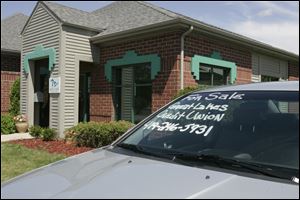
loan delinquencies on the rise
7/9/2009
Dave Seeger of Great Lakes Credit Union says the value of privately selling vehicles is more than twice what auctions provide.
As president and chief executive officer of Great Lakes Federal Credit Union, Dave Seeger has made a career of moving money. Now, to protect his credit union's financial performance, Mr. Seeger is having to move metal as well.
"My employees call it Crazy Dave's Auto Lot," Mr. Seeger joked about his credit union's efforts to privately sell vehicles it has repossessed. "It's something we never had to do years ago, but now we have to do it. And frankly, it's a win-win-win for everybody."
Great Lakes, with branches in Perrysburg and Sylvania, is among a growing number of small financial institutions locally and nationally who have taken to selling repossessed automobiles, boats, and other high-ticket items on their own instead of taking them to auction.
A quarterly report by the American Bankers Association released this week showed that auto loan delinquencies shot up nearly a full percentage point during the first three months of 2009.
The increase, from 2.03 percent to 3.01 percent, was the sharpest gain among a large number of loan categories experiencing increasing delinquencies, and a sign that continuing job losses have taken a heavy toll on personal finances.
"The No. 1 driver of delinquencies is job loss," said James Chessen, chief economist for the American Bankers group. "When people lose their jobs, they can't pay their bills. Delinquencies won't improve until companies start hiring again and we see a significant economic turnaround."
Mr. Seeger said selling a repossessed vehicle on its own "is a lot more labor-intensive than you realize." But, he said, the extra work makes a big difference on the bottom line. "When we take a car to auction, we usually get about 40 cents on the dollar. Years ago, that was satisfactory, because we were only [repossessing] a couple of cars a year. But we're averaging 94 [cents on the dollar] when we sell the cars ourselves."
Ron Patton, senior vice president of lending at Directions Federal Credit Union, Sylvania Township, said auto delinquencies have risen in the last year, especially among customers who lose their jobs and voluntarily surrender their vehicles to their lenders.
"Before it becomes a repossession, we do about everything we can to work with our customer to keep them in the car and keep the loan on the books," said Mr. Patton.
While most of the cars Directions repossesses are sent to auction, "We try to sell some of the better ones that we get back."
If a financial institution is able to sell a vehicle on its own, the added return often translates to less money the debtor ends up owing, Mr. Patton explained.
"Most people don't realize that once we get the auto sold and get the proceeds back, if there's a deficiency, we have to charge that back to the customer. Even when they turn in a vehicle voluntarily, they're still responsible," for the difference between the proceeds from the sale and what is owed on their loan, Mr. Patton said.
Some financial institutions sell their repossessed items by sticking a price on it; others, such as Jeep Country Federal Credit Union in Holland, conduct sealed-bid auctions to get rid of the property.
Contact Larry P. Vellequette at:
lvellequette@theblade.com
or 419-724-6091.